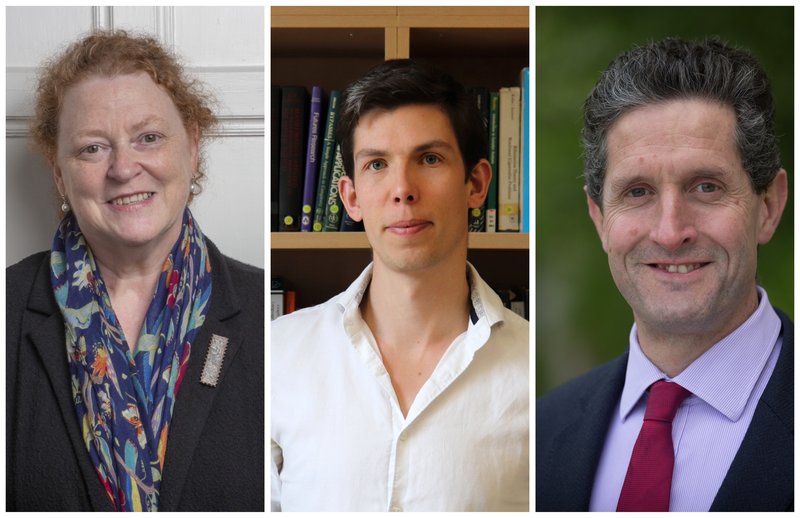New Fellows of the Royal Society
The College warmly congratulates the President, Professor Dame Sue Black, Professor James Maynard (Professor of Number Theory and Supernumerary Fellow) and Professor Myles Allen (Professor of Geosystem Science and Honorary Fellow) on their election as Fellows of the Royal Society.

Dame Sue Black, Baroness Black of Strome DBE FRS, President of St John's. Sue Black is an internationally recognised anatomist and forensic anthropologist whose research on human morphology and biometrics has had global impact. Her research has been used to assist with international war-crime investigations and to identify those involved in mass-fatality events. She has developed methods for hand-based person identification which have enabled national and international police forces to prosecute perpetrators of child sexual abuse. Sue has been at the forefront of driving new initiatives in anatomy, raising the scientific standards of forensic anthropology, and pioneering educational primers for the judiciary. She also has an outstanding record in promoting public understanding, most recently as the Royal Institution’s 2022 Christmas Lecturer.
Sue commented:
'All new Fellows of the Royal Society will say what an honour it is to be inducted into our national academy of science and I could not agree more. It is the pinnacle of a career to be recognised by the oldest continuously existing scientific academy in the world although, as an anatomist and a forensic scientist, I find myself wondering where I fit within such exalted company. The Royal Society also recognises those who bridge disciplines and serve to communicate and engage with the public as science continues to change the world around us at breathtaking speed. I have seen the Royal Society really challenge the boundaries between science and the law, making our justice system one to be admired around the world and it genuinely gives me a true sense of pride to be a very small part of that process'.
Professor James Maynard FRS, Professor of Number Theory, Mathematical Institute, University of Oxford and Supernumerary Fellow at St John's. James Maynard has many spectacular works in analytic number theory, particularly the theory of prime numbers. He developed a new method in sieve theory and applied it to find bounded gaps between consecutive primes, and then to find the largest known gaps between consecutive primes. He combined sieve theory and Fourier analysis to show that there are infinitely many primes missing any given digit in their decimal expansion. With Koukoulopoulos, he developed novel combinatorial methods to resolve the long-standing Duffin-Schaeffer conjecture in diophantine approximation. In a monumental series of recent works, he has substantially advanced our understanding of the distribution of primes in arithmetic progressions. James Maynard was awarded the Fields Medal in 2022.
James said:
'It is a great honour for me to be elected as a fellow of the Royal Society – I'm delighted! It feels amazing (if a bit surreal!) to have my name alongside so many famous scientists throughout history. It was reading about historical Fellows of the Royal Society like Newton and Hardy as a child that inspired me to become a mathematican in the first place'.
Professor Myles Allen FRS, Professor of Geosystem Science, Environmental Change Institute, University of Oxford and Honorary Fellow of St John's. Myles Allen is a climate scientist who has made ground-breaking contributions to quantitative understanding of climate change with substantial impacts on climate policy. He pioneered combining physically-based models with statistical analysis to quantify, with uncertainties, the magnitude of anthropogenic influence on observed climate change and using observations to constrain climate forecasts. He combined fundamental physics and large ensemble modelling to constrain the response in both mean and extreme precipitation to rising temperatures and increasing greenhouse gases. Furthermore, he demonstrated the cumulative impact of carbon dioxide emissions on global climate, which leads to the concept of a limited ‘carbon budget’ associated with any given level of carbon dioxide-induced warming. This links directly to net zero emission targets replacing concentration stabilisation targets as the focus of climate change mitigation policy.